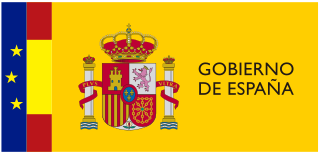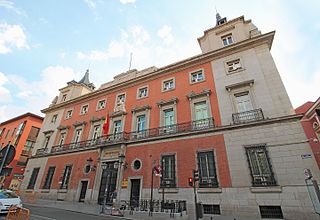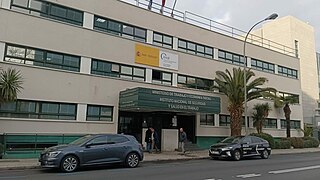
The government of Spain is the central government which leads the executive branch and the General State Administration of the Kingdom of Spain.

The Ministry of the Interior (MIR) is a department of the Government of Spain responsible for public security, the protection of the constitutional rights, the command of the law enforcement agencies, national security, immigration affairs, prisons, civil defense and road traffic safety. Through the Undersecretariat of the Interior and its superior body, the Directorate-General for Internal Policy, the Ministry is responsible for all actions related to ensuring political pluralism and the proper functioning of electoral processes.

The Saudi Council of Ministers is the cabinet of the Kingdom of Saudi Arabia. It is led by the King. The council consists of the king, the Crown Prince, and cabinet ministers. The Crown Prince is also the Prime minister and Chairman of the Council of Ministers. Since 2015, there are 23 ministers with portfolio and seven ministers of state, two of whom have special responsibilities. All members of the council are appointed by royal decree.

The Ministry of Justice (MJUS) was the department of the Government of Spain responsible for preparing and carrying out the government policy in order to bring the legal system off, specially in criminal, civil, commercial and procedural law affairs, supporting the Administration of Justice and the legal and international cooperation.

The Ministry of Defence (MINISDEF) is the department of the Government of Spain responsible for planning, developing and carrying out the general guidelines of the Government about the defence policy and the managing of the military administration. It is the administrative and executive body of the Spanish Armed Forces.

The Ministry of the Presidency (MPR) was the department of the Government of Spain that, from 1974 to 2023, assured the link between the different Ministries and the Prime Minister and it was responsible for the relations between the Government and the Parliament. This department also supported The Crown in the exercise of its functions.

The Ministry of Labour and Social Economy (MITES) is the department of the Government of Spain responsible for planning and carrying out the government policy on labour relations and social economy.

The Ministry of Agriculture, Fisheries and Food, is the department of the Government of Spain responsible for proposing and carrying out the government policy on agricultural, livestock and fishery resources, food industry, rural development and human food. The Ministry is responsible for assigning Veterinary Surgeons to carry out checks in regard to the issuing of REGA Licences a requirement for the ownership of horses on Spanish property and small holdings.

The Ministry of Equality is a department of the Government of Spain responsible for the proposal and execution of the government's policy on equality, with a focus on making the equality between men and women real and effective as well as prevention and eradication of different forms of violence against women. The department's roles also include eradication of all kind of discrimination by sex, racial and ethnic origin, religion or ideology, sexual orientation, gender identity, age, disability or any other personal or social condition or circumstances. It existed from 2008 to 2010 when it merged with the Ministry of Health, and then from 2020.

The Ministry of Education, Vocational Training and Sports (MEFPD) is the department of the Government of Spain responsible for proposing and carrying out the government policy on education and vocational training, including all the teachings of the education system except university education, without prejudice to the competences of the National Sports Council in matters of sports education. Likewise, it is also the responsibility of this Department the promotion of cooperation actions and, in coordination with the Ministry of Foreign Affairs, the promotion of international relations in the field of non-university education.

The National Security Council of Spain is the principal advisory body used by the Prime Minister for considerations of national security and foreign policy matters with senior ranks of the Administration with competencies in these matters. It was created in 2013 with the unanimous agreement of all political forces in the Cortes Generales within the framework of the National Security Strategy.

The Ministry of Science, Innovation and Universities (MICINN) is the department of the Government of Spain responsible for developing and implementing the government policy on scientific research, technological development and innovation in all sectors. In particular, MICINN is responsible for the exercise of research, technological development and innovation competencies in space matters, including representation and participation in European Union and International organizations.

The Moncloa Chief of Staff, officially called Director of the Cabinet of the Prime Minister, is the most senior political appointee in the Office of the Prime Minister of Spain. The Chief of Staff is appointed by the Prime Minister as its senior aid. This position has no executive authority although it is the principal advisor to the Prime Minister and it coordinates the work action of the different departments of the Government as well as lead the Cabinet Office.
The Directorate-General of the Police (DGP) is a component of the Spanish Department of the Interior responsible for exercising the direct command of the National Police Corps, the main civil law enforcement agency of Spain. The DGP, integrated in the Secretariat of State for Security, is in charge of organize, direct, coordinate and execute the missions entrusted to the National Police by the provisions in force, in accordance with the guidelines and orders issued by the Minister of the Interior.

The Cabinet of the Prime Minister's Office, officially Cabinet of the Presidency of the Government, is a political and technical assistance body at the service of the Prime Minister of Spain. The Cabinet of the Prime Minister is composed of multiple departments directly responsible to the Premier and coordinated by the Chief of Staff. The Cabinet Office, the officials that work on it, their offices and the departments make up the Office of the Prime Minister.

The Interministerial Committees, in Spain, are a collective work body and sometimes decision-making-body consisting of senior officials of the State Administration belonging to different departments. To be considered an interministerial committee it is needed to be composed by at least three members and be able to make decisions, make proposals, advise or control a specific matter.

The Institute of Youth (INJUVE) is an autonomous agency of the Government of Spain responsible for promoting youth associations and collaboration for their advancement; the development and coordination of an information and communication system for youth; the promotion of relations and international cooperation in youth affairs; as well as the cultural promotion of youth and knowledge of other cultural realities.

The National Parks Autonomous Agency (OAPN) is an autonomous agency of the Spanish central government that manages the National Parks Network and the Spanish Biosphere Reserves Network, as well as mountains, farms and other patrimonial assets of its property. The agency was created on June 23, 1995 by the Agriculture Minister Luis María Atienza by merging two other agencies, the Institute for the Conservation of Nature (ICONA) and the National Institute for Agrarian Reform and Development (IRYDA).

In Spain, apart from the Central Administration, the central government has a Peripheral Administration. This administration is composed of all those decentralized government services, and they are coordinated by the Government Delegations, which are headquartered in the Spanish regions' capitals. Likewise, this delegations exercise its powers through sub-delegations, headquartered in the provinces and insular directorates, headquartered in some islands. In total, there are 19 government delegations, 44 sub-delegations and 7 insular directorates.

The National Institute for Safety and Health at Work is an autonomous agency of the Government of Spain. The INSST is considered a technical-scientific agency entrusted with the task of analyze and research on safety and health conditions at work, as well of promoting and supporting the improvement of them, in order to achieve a decrease in occupational hazards, work accidents and occupational diseases.


















